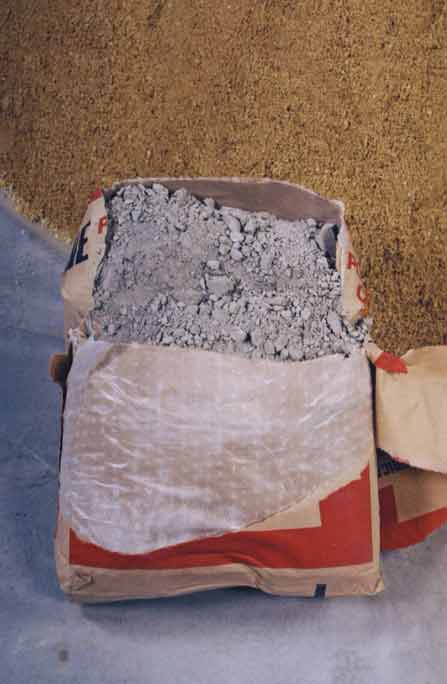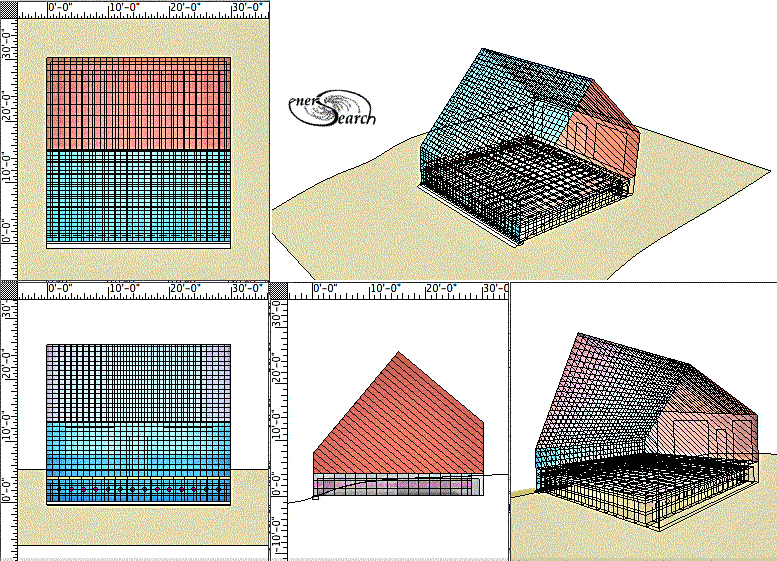
Bad Bags Weaken Cement Prematurely

It is almost impossible to obtain unspoiled, bagged-Portland-cement-powder because cement manufacturers insist on punching large numbers of holes in the bags. These bag-holes hurt the user-consumer. These bad cement bags suck in humidity from the atmosphere at an alarming rate. When the user transfers cement into air-tight containers, the cement can last for years. If left in the manufacture's bags, the cement becomes lumpy in a short time, especially in high humidity weather.
Bo's notes on cement mixes for small projects.
Drawing Below : Nominal CAD Concept Model For an Anti-Humidity Cement Shed (Solar Heated)

Solar heating helps keep cement unspoiled for much longer. Storing heat in the floor moderates the heat while tending to dry the interior. The "transluscent" plastic (blue in picture) must be faced to the south, (within northern hemisphere).The ideal design would benefit from naturally conveyed solar heat, using a solar chimney to increase heat transfer. The transfer of heat to building foundation could be fan driven and solar panel powered for grid free connection. The solar system always captures a little more heat in the concrete floor than outdoor ambient temperature. Moisture is thus driven away by "reversing condensation". Moist air will not condense on bags if the bags are kept a little warmer than the humid-out-door air. Condensation occurs near ordinary concrete floors because they are most frequently colder than the humidity in the air. Doors must normally be kept closed to gain heat in the solar shed and the floor. Thus condensation is considerably repelled by the stored heat and from bags while they retain solar heat gains.
Bagged Cement Vendors
Dear ___________,
There is a big problem with bagged cement. I ordered 40 bags the other week
and most bags had absorbed enough moisture that I could hear rattling particles
inside. I moved each bag personally so as to place them inside an air-tight
seal of plastic. Some broken bags had hard lumps. I have sifted quite a
bit which is not pleasant and wastes time. Worse yet is to know that my
building
effort is compromised by degraded product. Some bags have what
appear to be rain satins on the paper. How can the cement industry not
realize the difficulty of builders and supply chains, with exposures to weather?
This is a unnecessary problem forced into the marketplace. The
cement bags ruin cement for the consumer because businesses,
cannot make up for these bag holes. Why degrade an important product?
I was hoping you could make a big complaint at a distributor to manufacturer
level. Present these facts. Ask for a reasonable solution. All they need
to do is stop punching holes in the plastic liners, inside the paper
bags. This
should save them a step in packaging. One engineer told me they need
the holes in order to simplify bag filling. Another engineer said the cement
would harden
if initially sealed. No scientific rational was given.
I
can store Portland Type I cement in air tight containers for years, without
getting
lumps. Many other industries protect products from rain and humidity.
I felt badly receiving this
order which in fact was an attempt to save your company delivery time
through
smaller deliveries. I have been buying just 6 bags a week which seems
my only way to avoid my present problem. I have ended up getting a
collection of the
worst cement in your inventory. Putting out fresh cement in your yard
will
collect new moisture and degrades more bagged cement. Why waste resources and money?
I hate to bother you with returns which your well-meaning staff has
offered. I also prefer conservative measures which stop
waste and money.
I will
suffer this time, perhaps a loss to me of 20% value. I will post this letter on my web page
blog.
Thanks for your consideration,
Bo Atkinson
![]()
Comments are invited. Consultancy or constructive cooperation is offered. These research pages are in the The content on this website, http://harmoniouspalette.com, is placed in the public domain only as a free exchange of ideas and as a "hard studied wish to serve life". The author assumes no responsibility for the improper use of the concepts in these web pages. All relevant laws of life and local codes should be verified and observed before any building or experimentation proceeds. discussion is welcome, please write. Bo Atkinson and are furnished "as is". The author makes no warranty, express or implied, for any purpose. The author assumes no responsibility for the use or misuse of this research.